
An Umbrella Showcase |
Carmine Street Metrics: Reminiscences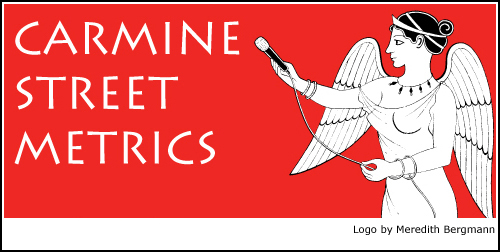
Wendy Sloan: I didn’t know Terese Coe very well when she asked if I’d be willing to help out with the Modern Metrics readings. I said yes, of course. I could see why they needed help. Quincy was away teaching in Ireland that year, Nemo was spending more time on other projects, and Terese was kept busy rescuing Ray Pospisil from himself. Ray dominates my memories of those early days—warm, generous, floundering, reflective, haunted Ray. He was tall, on the lean side but still muscular, and he moved with cat-like grace across a stage, delivering his stunningly fluid, colloquial iambic pentameter. Meredith Bergmann: I remember my shock when Ray, whom I hardly knew then, said “Why don’t you give a reading?” It hadn’t occurred to me that I could do that. Ray said it as though it was the most natural thing in the world and not a Thing of Great Consequence, but it felt like that to me. Wendy Sloan: Ray listened, Ray heard every word when you read your work and responded afterward with observations that were spot on. He would put a lot of energy into the series, then go AWOL, not coming to the readings or responding to emails. Then, suddenly, he’d be back, playing the perfect co-host, keeping track of the open mic for me, joining us afterwards at the bar down the block from that small theater at the South Street Seaport. R. Nemo Hill: Though far from everywhere, the Shooting Star Theatre had its charms. Jee Leong Koh first read for Modern Metrics there. As did Austin MacRae for his chapbook release. The after-gig bar we drank at that afternoon had a ceiling dangling with donated brassieres. I like to think maybe some of them belonged to poets. KateBB: That’s when I met Ray, during the South Street Seaport era, and that’s where I heard him read “The Bell.” The first time I attended, I’d forgotten my wallet, so Ray kindly bought me a glass of white wine at that bar’s outdoor cafe. I could not help but notice that Ray himself drank bottled water. He was on the wagon. Wendy Sloan: Ray spoke of an uncle who used to “sing opera.” “Singing opera”—at first I didn’t get it—meant you’d drunk yourself sick. KateBB: Not long after, Quincy posted a message on the General Announcements board at Eratosphere with the stark thread title, “Ray Pospisil has died.” Meredith Bergmann: I wish he was still with us, writing fierce new poems about our Occupations and preoccupations. Wendy Sloan: So we were left, for that season, surprisingly, a girl group, consisting of myself, Terese and Meredith, who designed our new deep carmine logo à la Sappho to go with the new name Terese had suggested, “Carmine Street Metrics,” and our then-new location at the Carmine Street Bistro. Terese Coe: When Michael Bergmann mentioned that carmine was a form of the Latin carmen, it kindled great excitement among us, as carmen means song, poem, oracular utterance, and incantation. What more could one ask of a name, or a poem? KateBB: Oh, the Bistro! The readings were on Sundays at 4 pm, so there were still customers in the restaurant enjoying their brunch. Readers stood at a mic in the front of the place, so new customers would march right by as they came in the door. The wait and bar staff clattered and chattered. This was where I did my first featured reading, which felt magical to me because the staff actually quieted down and listened. Of course, I had wooed them ahead of time, with a handout of my program and special M&Ms! You gotta do what you gotta do. Wendy Sloan: That was some place! Some others who read there were Robert B. Shaw, Charles Martin, and A. E. (Alicia) Stallings. Meredith Bergmann: I particularly enjoyed Alicia’s reading. The ambient noise was unusually obstreperous that afternoon, but she gave a very strong and delightful reading. Quincy R. Lehr: And then I came back from my teaching stint in Galway. In my absence, something had changed. The reading series that had survived from month to month and feature to feature had become robust and regular in the best way, with a core audience who showed up consistently. Even though I had told myself that I would focus on my own work rather than getting sucked up into the organizational side of poetry, I would soon be juggling schedules and announcements and venue owners again. KateBB: Bar on A was a far better venue, with a real stage and a louche downtown vibe. We had to make sure the program didn’t overshoot the time allotted because of the retro striptease show that followed! R. Nemo Hill: Oh, yeah, those fabulous burlesque shows that followed the Bar on A readings—I stayed for several of those and had a wild time. It’s quite therapeutic to abandon oneself to free verse cat-calls after an hour or two of metrical discipline. Wendy Sloan: Then Bar on A transformed into a sports bar. No room for poets! We were sad to lose that venue but overjoyed to land a contract with the Bowery Poetry Club, with its great sound system and its heralded history. Eric Norris: I sometimes wonder if anyone feels stranger than I do standing behind the microphone at the Bowery Poetry Club where I always feel underdressed . . . where I drink too much and speak too softly . . . where I was very humbled when Quincy Lehr and Wendy Sloan asked me to help host late last year . . . where I was able to reintroduce Jee Leong Koh recently as a featured reader. And where I feel like the luckiest man in New York at least once a month, listening to some of the finest poets writing today. Quincy R. Lehr: One constructs a successful reading series less out of a focused aesthetic vision than, well, poets themselves, eclectic, often doggedly independent types that they are. I always look forward to my three minutes at the mic to read a poem, and am even more chuffed to introduce so many fine poets when I'm serving as emcee. It’s part of the learning process of being an editor and/or event-runner, I think. You trust the people you’ve picked to have a vision, and you trust your journal or reading or whatever to have enough suppleness to adapt, shift and grow. It’ll sound like I’m just saying it, but the regulars, as a group, are just fantastic, which keeps my enthusiasm level up and makes all the boring bits worth it—and Eric and Wendy have that combination of real talent and relative sanity that is rare in poets, which helps a great deal as well. Wendy Sloan: There’ve been so many great readings over the years. Ernie Hilbert’s dynamic reading, with piano accompaniment, on the same program with Nick Friedman, whose poems shined with polished lyricism. The Joshua Mehigan/Terese Coe double feature, when Joshua followed up some of his own work with Byron’s futuristic dystopia, “Darkness,” and Terese read her keenly observed poem to her son, “For I Will Consider.” Anna Evans’ fine work, read in that cozy Bar-on-A space with hardly a hint of separation between reader and audience. The dynamic open mics where Quincy, Nemo, Rick Mullin, Terese, Robert Donohue and other regulars (me too!) tried out new work—sometimes joined by John Foy. George Green’s hysterically funny readings. Chris O’Carroll’s and David Yezzi’s polished performances. KateBB: I was floored by Meredith Bergmann’s innovative presentation. She read just one poem—a sestina—but she read it twice. In between, she showed slides and clued us in to all the many historical and artistic references in the poem. An iPad was her high-tech presentation tool. Wendy Sloan: And there was Rory Waterman’s moving revelations of his childhood. Kim Bridgford generously coming up to read for us shortly after assuming responsibility for the West Chester Poetry Center and Conference. Catherine Chandler traveling all the way down from Canada and Claudia Gary coming in from Virginia for our inaugural reading. Lee Slonimsky, who contributed so much energy to the old Iambs & Trochees series, reading for us, together with Elizabeth Coleman, one sunny Sunday afternoon at Bar on A. And when Carolyn Raphael launched her fine book, The Most Beautiful Room in the World, she made the unconventional decision to include an open mic; this became the model for all our future launches. And that doesn’t even cover the many great poets whose features I missed (including Molly Peacock, Marcia Karp, Rachel Hadas, Marybeth Rua-Larsen) or who are reading for us this season (e.g., George Witte, David M. Katz, W. F. Lantry, Linda Stern, David Mason, Cally Conan-Davies)—or our esteemed co-hosts! It’s been great, participating in a growing poetic community: Meredith bringing in Shaune Bornholdt, David Katz & Linda Stern coming on board, Robert Donohue’s evolving, off-beat work, Allen Tice’s witty erudition. And Eric Norris joining most recently, bringing along more friends and associates: Wendy Chin-Tanner, Jee Leong Koh, others. The universe is expanding.  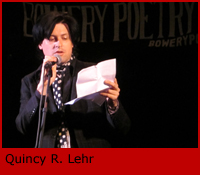 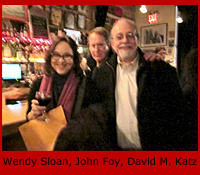 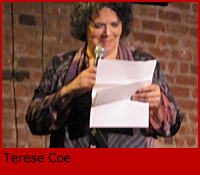 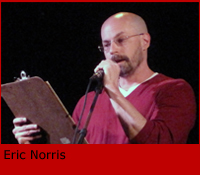  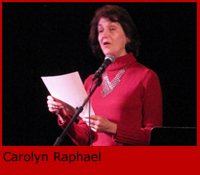 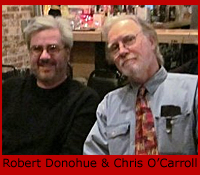 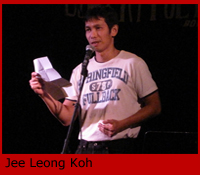 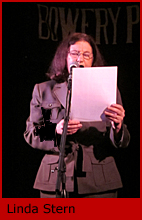 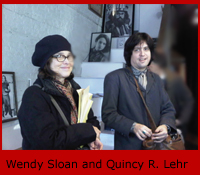 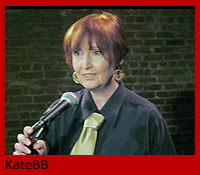
| ||
|
|
|||